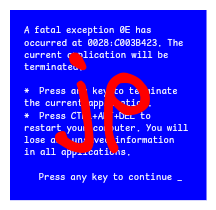Microsoft intentionally made programs install to C:\Program Files on Windows 95+ to force programmers to deal with spaces in filenames.
Someone make one of those “statements made by the utterly deranged” memes about it, please and thank you.
what is even more funny about this is that the name of that directory used to be locale-dependent, so in sweden it was just called “Program”, completely nullifying that idea.
C:\Program Files
C:\Program Files (x86)
C:\ProgramData
C:\PROGRA~1
me coming back to cmd after spending a month in command.com:
The fucking parenthetical x86 absolutely kills me. I don’t normally wish dick cancer on people,
It’s only localised in the file explorer. The actual folder name is always Program Files.
Only since vista, it used to be localized.
what about placeholders/variables like %localappdata%, %windir%, %programfiles%?
I can only assume these always existed, otherwise it would have been a nightmare for everyone.
Excel used to have, and I think it still has, localised function names.
Makes it a nightmare to look up stuff on the Internet.
the entirety of office has localised hotkeys. whaddayamean ^F is “search”? it’s for fat text!
Still does. Commas or semicolons as separators in functions differ at least. It fucking sucks.
nope, that’s an NT thing
Really? That is absolute insanity
No this is just clever
Given even what little I know of their history and what they are doing now, I cannot be sure this wasn’t the intention at least partially
I’ve recently learned that in Linux, you can use emois in filenames. I died a
littlelot inside when I learned that.On Linux file systems you can use any character except NULL, and / is a reserved character.
E.g. on ext-4 “All characters and character sequences permitted, except for NULL (‘\0’), ‘/’, and the special file names “.” and “…” which are reserved for indicating (respectively) current and parent directories.”
I once accidentally created a file with a newline character in it… it was pretty tricky to fix from command line.

Arrest this person
This is absolutely haram
it was on accident, habibi, I swear 😁. I messed up some cmake code for preprocessing .txt ascii sprites into constants and accidentally created this abomination
I once made a script to delete .o, .lib, and .so files from my huge dev folder to free up space on my home partition.
It did not go as planned.
O no, o no no no
This is why you shouldn’t parse
lsoutput btw. Usefindandreadinstead
I actually did this a lot on classic Mac OS. Intentionally.
The reason was that you could put a carriage return as the first character of a file, and it would sort above everything else by name while otherwise being invisible. You just had to copy the carriage return from a text editor and then paste it into the rename field in the Finder.
Since OS X / macOS can still read classic Mac HFS+ volumes, you can indeed still have carriage returns in file names on modern Macs. I don’t think you can create them on modern macOS, though. At least not in the Finder or with common Terminal commands.
I created a file with backspace in name, it was hard to understand why filename doesn’t match
I don’t conduct interviews very often, but when I do, one of my questions is always about interacting with files that have special characters in the filename.
Did you not just use tab? That’s the usual method of dealing with weird characters in filenames that I’ve found
This was quite a while ago now, but I don’t think my shell escaped the tab complete properly, I remember it just printing a literal newline and evaluating it as a second command. I think there was other unicode in there too, otherwise I would have just typed it out. I had to do something with null terminated output and piping it in to
mv, but I can’t remember what exactly.Too bad when there’s multiple files starting with and consisting mostly of e.g. kanji (when on a Latin keyboard).
With the right shell, you can just press tab multiple times to cycle through the possible completions.
So … is allowed, or all whitespace, or Zalgo text.
I mean, on the one hand, I guess why be restrictive, but on the other I feel like requiring something that looks like language somehow might be a good idea to avoid edge cases and attacks.
You can have new lines in your file names. YSAP has a good video/playlist about how to deal with these and many more.
could you have
..? I assume most terminals would just spell out.\x200b.?Or use a hair space so it looks almost the same. Or … but you’ve added the right-to-left unicode character. I’m guessing there’s something that looks a lot like a period, too.
If ext4 doesn’t include restrictions terminals probably should.

In filenames? AMATEURS! Use obscure Unicode in your passphrases for maximum security. Ctrl-Shift-U, enter arbitrary code point, bam! 🦊 Works even better with a Compose key and a nice, chonky
.XComposefile to throw some gr∑∑k letters around, for instance, like some confused script kiddie. :)On topic: There are multiple variants of spaces in Unicode. You’re welcome, and now go and create something utterly deranged with that information.
I already deal far too much with trying to handle dumb fucking typos in employee data, and trying to turn human names into valid email addresses.
The first time I encounter something like this there will be a body. It will not be found.
иnteresting_idéa_lål.ㅅㅇ
Some grSSk letters?
yes, grSSk letters
This needs more upvotes. Chaos gods smile at you, and I thank you
unix filenames are just string of bytes, the operating system does not interpret it in anyway. this is a much saner approach compared to Windows where language settings can change file system behavior.
the operating system does not interpret it in anyway.
*in any_way. ;)
I’m just gonna pretend I didn’t hear that.
⏰️.🪵
ChatGPT is taking notes
10 seconds of googling indicates this is true for Windows and Mac as well. I haven’t looked specifically, but I’d be a little surprised if it wasn’t true for Android and iOS as well.
But really, why would they add rules to prevent people from using certain unicode codepoints in filenames? Should they disallow Klingon as well? Kanji? Of course not. Emojis are codepoints just like U+0061 is.
Of course there are good reasons to disallow things like newlines and forward slashes in Linux filenames, but what specifically would even be the argument for preventing emojis?
You can, but I downloaded some music the other day and I was trying to put the files onto my phone using KDE Connect, and I couldn’t understand why is wasn’t working until I got rid of the star emoji in the filenames. So I think Graphene/Android might still struggle with it.
Lol, I think that’s how I learned it was possible, too.
yt-dlpuses the title as the filename, and all of the emojis came along with it. Was trying to rename them from terminal, but couldn’t do much when half the filenames started with the fire emoji lol.
It’s all just Unicode
You can have emoji as your WiFi network name too
Kinda interesting to see what older devices do when faced with such a network
What about an emoji only wifi password?
Same for Windows (11): I just renamed a file to an apple emoji
I think that may be possible for every filesystem supporting UTF-8 encoding.
I have been using emoji in macOS for many years. It can be very useful to tag files.
You can use emojis for variable names in swift code.
I\ don\'t\ know\ what\ you\ mean,\ I\'ve\ never\ encountered\ any\ annoyances.
'I don\'t know what you mean, I\‘ve never encountered any annoyances.’
Single quotes don’t allow any escaping in shell, you need
'I don'\''t know what you mean, I'\''ve never encountered any annoyances'Or, in Zsh with
setopt rcquotes:'I don''t know what you mean, I''ve never encountered any annoyances'Oh right, good catch. That’s me shell scripting while in a meeting. 🫠
Good use of a meeting to be fair
it works in fish
Oh\ come\ on,\ it\'s\ not\ that\ badSome shells enclose those types of files within inverted commas. Such that:
> ls file\ name.mdis instead
> ls 'file name.md'(I use fish)
“inverted commas”? single quotes?
Yes, I am a weird english.
What is the Old Continent name of those: `
On its own, the backtick is primarily used in computing, and so doesn’t have an old-timey-English name, nor does the Jargon File mention a Commonwealth Hackish name for it. While there are a variety of other names, I don’t think any of them are specific to the UK
When used with a letter, it marks a grave accent; this was its original purpose on a typewriter
Floating commas
In dutch I’ve heard them be called flying commas unapologetically (vliegende comma’s — ironically has one in it because many plurals need it, it doesn’t mark possession)
Ik heb nog nooit iemand een ’ een vliegende komma horen noemen, wordt dat in bepaalde delen van Nederland meer gezegd?
I tried to parse the first one but got all confused because there’s no closing single quote.
Are you typing the whole filename by hand? Tab expansion exists, you know?
If it fucking works…
Sometimes it does. But not always.
Zsh changed my life, but I still hate escape chars in my command lines for readability reasons
Now I use lowercase and underscores everywhere.
Hyphens > underscores for filenames because all web standards prefer hyphens so if you ever want to network your files its a much smoother experience!
This is what I need, an explicit reason that makes one choice better than another. If hyphens make for a smoother experience, then I’ll reconsider my default behavior.
Thanks for pointing out this benefit.
They suck hard. I use the renpy engine and there you reference file names directly but always lower case and spaces and hyphens turn to underscores. That can cause issues, so I just do underscores in my file names. Don’t give damn about the web.
Yeah I prefer underscores too but kebab case is definitely better for web and general ergonomics. Dash doesnt require a shift hold! Tho I still mix these depeding on tool or existing idioms. One thing for sure is that spaces and capital letters are stupid and we should do less of them.
This is the best for tab completion, altho I prefer hyphens visually
I prefer lowercase with hyphens, but I’m transitioning into a team that does everything camelCase, which is the second best case, but I still strongly dislike it.
not sure why the default behavior is this:
file\ name\ with\ a\ bunch\ of\ spacesinstead of this:
"file name with a bunch of spaces"but you can just press
"before pressing tab to auto-complete, and it will use the 2nd formI mean, at least in Bash tools like
lsdo use quotes by default:$ ls filename_without_space 'filename with space'But yeah, tab expansion uses backslashes, sadly.
Because quoting requires token expansion (e.g. ~ to /home/you). Escaping gives you a much shorter path in that case.
That said I’m with you, full quoted paths read better to me.
You can use variables in
"like so:cd "$HOME/Desktop".Maybe this helps?
the struggle between spaces in filenames look cute and oh fuck what’s the code to reference a space in a filename in terminal?
Just put the whole thing in quotes. You might have to escape extra sets of quotes, usually with a backslash.
Or you can also put a
\in front of the spaceIf you intend on using that with tab completions, you will have extra work to do.
Some shells put the path in quotes automatically as you attempt to complete anything with spaces in it.
Yeah, just need to set it up correctly.
i think i am old. i grew up using DOS, and really hated spaces in filenames and folders because they appreared truncated at the first space with a tilde and index of that file/folder representation.
ex: C:\folder name is bad\ == C:\folder~1
i hated that so much that when i got to windows 3.1 i refrained from using spaces (some command line was still necessary in w3.1)
i have jept that habit through the years, so when i moved from windoes to linux, my natural instincts of snake_case_folder_names made it so i didnt have to change : D
That’s not even DOS I think. As far as I know Win 95 came up with this monstrosity in an attempt to circumvent the 8.3 character limitations present in older versions of DOS.
I think you’re misremembering a little. Long filenames was introduced in Win95.
One of the fun things about modern Windows is that ~1 shit still appears every once in a rare while. Gotta love just stacking more and more shit on top of ancient systems in the name of backwards compatibility!
Yea, Win 3.1 didn’t support long names - that came with Win95. Win 3.1 was a shell on DOS.
But I understand - it all blends together after um… 40 years (ouch!).
i think i am old
I very intentionally have all my code in
Personal Projects 🥰andWork Projects 🏦directories so I can find bugs in the handling of file paths." is your friend
Yep, exactly. And tab. \<space> is weird at first but makes sense if you think about it
I’m a big fan of PascalCase. ThisIsAGreatFilename.odt
Rust made me have an habit of using snake_case… .rs
If your code is written well, it shouldn’t matter.
They’re annoying to deal with when interactively using command-line shells, especially so when pasting unquoted and unescaped file paths, doubly especially so with Bash where parameter expansion makes no goddamn sense if you know at least one other programming language
Example of how parameter expansion matters?
Generally if you are pasting file paths there is a better way to do that. Use find with exec, or xargs, or a for loop. Or, get the list in Vim and escape (quote) every line at once. Unless you have double quotes in the filename too (which is actually a crazy thing) it shouldn’t be a big deal.
Expansion matters because using parameters without quotes automatically splits words, and IIRC a quoted array parameter can still be split into its members — as opposed to Zsh, where word splitting doesn’t happen unprompted and quoted array parameters are flattened into a single string.
Generally if I want to run
$HOME/random executable with spaces.exethrough Wine in a terminal I copy the path in Dolphin (CTRL+SHIFT+C, or CTRL+ALT+C idr) and paste it, within quotes if needed (the four extra key inputs are the annoying part).I find that much faster than manually typing
find "$HOME" -name "random executable with spaces.exe" -type x -exec wine "{}" \;, or opening an editor to insert backslashes.Why on earth not just type
wine ~/randomand then hit tab to autocomplete? Or you could dowine `echo random*`AFAIK, if $file is a filename with spaces, then
some_util ${file}will not split the filename.If the path to the dir is longer than
$HOME, say,$HOME/Tools/modding/hd2-audio-modder/wwise/v123456789_idr_but_its_a_long_one/random file name with spaces, it makes more sense.I’ll try using the braces syntax, if it does prevent word splitting I wasn’t aware of it, though it’s still slightly inconvenient (3 key inputs for each brace on my kb) and I’d probably still use quotes instead if I had to use Bash and had the file path in a variable for some reason.
… though at this point I’m probably overthinking it, atm I don’t recall better examples of my distaste for Bash expansion shenanigans.
Did some testing, here’s what I found.
Beware, it devolves into a rant against Bash and has little to do with the original topic - I just needed to scream into the void a little.# Zsh function argn { echo $#; } var='spaced string' argn $var # Prints 1: makes sense, no word splitting here var=(array 'of strings') argn $var # Prints 2: makes sense, I'm using a 2-wide array where I would # want 2 arguments (the second one happens to have # a whitespace in it)# Bash function argn { echo $#; } var='spaced string' argn $var # Prints 2: non-array variable gets split in 2 with this simple reference; # I hate it, but hey, it is what it is argn ${var} # Prints 2: no, braces do not prevent word splitting as I think you suggested var=(array 'of strings') argn $var # Prints 1: ... what? echo $var # Prints array: ... what?!? # It implicitly takes the first element? # At least it doesn't word-split said first element, right? var=('array of' strings) argn $var # Prints 2:
Upon further investigation:
# Bash mkdir /tmp/bashtest ; cd /tmp/bashtest touch 'file 1' touch 'file 2' stat file* # Prints the expected output of 'stat' called on both files; # no quotes or anything, globbing just expands into # 2 arguments without *word* splitting files=('file 1' 'file 2') stat $files # stat: cannot statx 'file' # stat: cannot statx '1' # WHY? WHY DOES GLOBBING ACT SENSIBLY WHEN ARRAYS DO NOT?I get that the Bash equivalent to Zsh’s
$arrayis${array[@]}, but making$arraybehave like it does in Bash has no advantage whatsoever.
… IS WHAT I WOULD SAY IF THAT WERE TRUE! YOU ALSO HAVE TO QUOTE"${array[@]}"BECAUSE WE LOVE QUOTES HERE AT BASH HQ!# ... continued from before stat "prefix ${files[@]}" # stat: cannot statx 'prefix file 1' # (regular 'stat' output for 'file 2')While this behavior doesn’t make much sense to me, it also doesn’t make sense for me to write that “prefix” within the quotes in the first place, right?
YES. BECAUSE SPLITTING IS NOT WHAT YOU EXPECT WHEN YOU PUT STUFF IN QUOTES.Sorry, I’ll stop.
My bad, I was thinking of zsh. And I think it’s configurable there too so may not behave that way according to your settings. But it is at least the default on Mac.
I use Zsh too, though at this point is becoming detrimental to my (already limited) Bash skills because of features like the
${^array}{1,2,3}syntax which I use in some scripts of mine, which in turn I wouldn’t dare try to translate to Bash.
Windows is stupid as shit, trying to shift+right click > open Powershell in a path containing a space results in it throwing an error, and you have to paste the path in yourself anyway
My work has me working with Matlab Simulink paths, which may (and sometimes actually do) contain newlines.

































